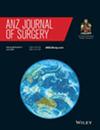Evaluating the Impact of Mental Disorders on Outcomes Following Esophagectomy for Cancer: A Systematic Review and Meta-Analysis
Abstract
Background
Esophageal cancer, the sixth leading cause of cancer-related deaths globally, imposes significant physical and psychological burdens on patients. Psychiatric comorbidities, such as anxiety and depression, are prevalent among esophagectomy patients and may adversely affect postoperative outcomes, quality of life, and survival. However, their clinical impact remains understudied and heterogeneous in existing literature.
Objectives
This systematic review and meta-analysis evaluates the prevalence and clinical significance of perioperative mental disorders in esophageal cancer surgery, assessing their association with postoperative outcomes.
Data Sources
A comprehensive search of Medline, Embase, CINAHL, CENTRAL, and Web of Science was conducted from inception to March 2025. (Keywords included “esophageal cancer,” “esophagectomy,” “anxiety,” “depression”).
Review Methods
PRISMA-guided analysis included 11 studies (n = 24 411 patients). Studies reporting preoperative psychiatric comorbidities or postoperative mental disorders (PMD) were eligible. Risk of bias was assessed using ROBINS-I. Random-effects meta-analyses pooled mortality risk, PMD incidence, and associated risk factors.
Results
Preoperative psychiatric comorbidities (11.8%–28.8%) increased mortality risk by 33% (RR 1.33, 95% CI 1.15–1.55, p < 0.001). PMD incidence was 29.8% (95% CI 21.2%–38.4%), with anxiety being the most common (29.5%). Key risk factors included stage III disease (OR 3.2, 95% CI 1.66–6.2), postoperative complications (OR 2.32, 95% CI 1.55–3.49), female gender (OR 1.35, 95% CI 1.07–1.69), and higher Charlson Comorbidity Index (OR 1.04, 95% CI 1.01–1.06).
Conclusions
Mental disorders significantly impact esophagectomy outcomes, elevating mortality, and complicating recovery. Proactive screening and multidisciplinary mental health support are warranted, particularly for high-risk patients.


 求助内容:
求助内容: 应助结果提醒方式:
应助结果提醒方式:


